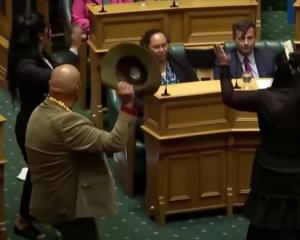Harry Love proposes the creation of a group that could sanction bad North Dunedin landlords whose businesses create a public nuisance, assist those who get stuck with bad tenants and perhaps gradually dilute the concentration of student tenancies.
Perhaps now some of the sound and the fury has died down, blame has been democratically apportioned (everybody has some) and nothing much has changed, this might be the moment to step back and take a sober look at the issues of student behaviour and alcohol.
On May 10, TVNZ presented a somewhat sensationalist piece of journalism on the ''crisis'' of Dunedin's student ''booze culture'' and the suffering it inflicts on its citizens.
This produced a flurry of accusation and counter-accusation as to the causes of the problem and claim and counterclaim as to the solutions.
What we have not had is a considered look at the nature of the problem, the various contexts in which it exists and what those contexts actually allow anyone to do about it.
We are reminded continuously by the University of Otago that it is Dunedin's biggest industry, without which we would be little more than a village on the way to Balclutha.
A consequence of growth over the last 15 to 20 years is a concentration of large numbers of young people in the north end of town and the creation of so-called ''scarfie'' culture, which both city and university have been happy to encourage and exploit, until signs appeared of it getting out of hand; the market at its most vigorous and unplanned.
Hence the ghetto effect as local residents have been forced out; as one student landlord has said, he could always outbid an owner-occupier.
Therefore, the single most significant element that needs to be addressed at one level is the sheer concentration of young people.
And they will do what they have always done - even Socrates complained about them - especially where their numbers are undiluted by the more chronologically challenged, and where their living arrangements entail only a commercial relationship with a landlord, free of the institutional restraints of colleges.
The University of Otago has made some inroads into this situation through Campus Watch and a firmer stance on behaviour that brings the university into disrepute.
These measures can perhaps be enhanced, and they will always be necessary to deal with the few whose idiocy or arrogance lacks control, however benign the environment.
However, the wider question is how to create a more benign environment in a situation which is predominantly characterised by private landlords and their (technically) adult tenants.
Landlords, like students, come in all shapes and sizes and with a similarly varying grasp of their responsibilities.
There are those who are simply happy to take the rent and send someone in to clean up at the end of the year. And they're not too fussy about who pays the rent.
On the other hand, there are those who spend considerable time and money to keep their property in good condition and who are careful about to whom they let (see ODT, 23.5.15, ''The rights and wrongs of student flats'').
One has told me that he insists on a ''no-party''clause in the lease (not ''no-alcohol'') and scores a 90% success rate. His flats are immaculate.
The Otago University Students' Association flatting support services are an excellent step in the right direction, but are impotent in the face of non-students, or students and landlords who don't care (or aren't there).
The Tenancy Act does provide for individuals to take a bad landlord to a tribunal, but how many young people would bother, even if they knew that they could?
Would it be possible to set up a permanent body representing the city council, tertiary education institutions, including the student body, landlords/property management and perhaps a local member of Parliament, which, with appropriate legal expertise, could oversee a development strategy for rental property and the standard of rental accommodation throughout the city by bringing together and working to improve regulations that govern the rights and responsibilities of all the affected parties?
And by ''standards'' I don't just mean the quality of buildings, but the standard of behaviour that goes on inside them, in so far as it affects the environment.
A body that, with the city council, could sanction bad landlords whose businesses create a public nuisance, assist those who get stuck with bad tenants and perhaps gradually dilute the concentration of short-term student tenancies.
We need, as Meg Davidson suggests (ODT, 28.5.15), a stable population to steady the flux of student life.
A city that can guarantee a decent and reliable standard of rental accommodation must be an attraction for anyone who wishes to come here.
Such a thing would take time and resources, but is likely to be more effective in the long run than blanket liquor bans or revisiting the liquor laws of the 1960s, which didn't really work and which merely invite the more rambunctious and ingenious of the denizens of the ghetto to bend the rules while they go through the rite of ''roughing it up''.
By addressing ''standards'' of living, both the need and the desire to rough it up might well diminish.










